|
In its largest acquisition to date, internet giant Google yesterday agreed to buy cell phone maker and video technology provider Motorola Mobility Holdings, for $12.5 billion in cash. Google had had offered to pay a whopping $2.5 billion if it decided to walk away from the deal.  The deal is also the largest acquisition in the technology industry this year, eclipsing the $9.5 billion purchase in May of Skype by Microsoft from Silver Lake Partners. (See: Microsoft acquiring Skype for $8.5 bn) The deal is also the largest acquisition in the technology industry this year, eclipsing the $9.5 billion purchase in May of Skype by Microsoft from Silver Lake Partners. (See: Microsoft acquiring Skype for $8.5 bn)
But the proposed acquisition is likely to be overshadowed by Microsoft, which is rumoured to be talking to Nokia in a $27-billion takeover deal. Google, which has made 11 acquisitions so far this year and had about $39 billion in cash three months ago, will pay $40 per share, a 63-per cent premium to Motorola's closing price on 12 August. Although Motorola makes cell phones exclusively on Android operating system and is one of the largest manufacturers of set top boxes in the US, the deal is more about laying hands on Motorola's trove of more than 17,000 patents on phone technology, nearly thrice the number of patents than Nortel Networks', that were recently acquired by a consortium of technology majors (See: Apple, Microsoft, Sony, RIM bag Nortel patents for $4.5 bn). Motorola Mobility holds approximately 14,600 granted patents and 6,700 pending patent applications, worldwide, as of January 2011. It is now clear why Google's CEO Larry Page offered a dismal sum of $900 million in a stalking-horse bid for the bankrupt Nortel's 6,000 patents and pending patent applications across wireless, wireless 4G, data networking, optical, voice, internet, semiconductors and other patents. Commentators say the moves just made it more expensive for his rivals to buy those patents, which were last month auctioned for $4.5 billion by a consortium comprising Apple, Microsoft, Sony and BlackBerry maker Research in Motion, EMC and Ericsson. Industry analysts were baffled as to why Google, which has only a meagre 1,000 patents, let go off Nortel's patents so easily without giving a fight to its rivals, especially since it was sitting on a very large cash pile and had even offered to pay $6 billion to buy Groupon last month. With mobile computing emerging as a critical revenue growth, nearly all major handset makers have been recently suing each others over patents infringements the latest being Apple to sue Samsung over its iPhone and the iPad looking and feeling similar to Samsung's Galaxy smartphone and tablet (See: Apple granted ex-parte injunction barring Galaxy sales in Europe). Currently over 40 lawsuits have been filed against Android, including suits from Oracle, Microsoft, and Apple, which has made Google give the software to mobile handset manufacturers for free instead of earning money through licensing fee. Compared to Nokia, RIM, Samsung, Microsoft and other major mobile handset and software makers, Google holds the least amount of telecom patents, which has made its Android operating system vulnerable as it is being used by mobile handset makers like Samsung, HTC, Sony Ericsson, LG, Motorola and 34 others. Larry Page said that the Motorola acquisition will strength its patent portfolio and enable it to protect Android from anti-competitive threats from Microsoft, Apple and other companies. ''We recently explained how companies including Microsoft and Apple are banding together in anti-competitive patent attacks on Android. The US Department of Justice had to intervene in the results of one recent patent auction to ''protect competition and innovation in the open source software community'' and it is currently looking into the results of the Nortel auction. Our acquisition of Motorola will increase competition by strengthening Google's patent portfolio, which will enable us to better protect Android from anti-competitive threats from Microsoft, Apple and other companies,'' he said. Motorola Mobility, run by its CEO Sanjay Jha, is one of the biggest makers of mobile handsets that run on Google's Android mobile operating system, including its smartphones and the Xoom tablet computer. The deal would also give Google Motorola Mobility's hardware-manufacturing business, which will enable it to better compete with Apple Inc, which makes both the hardware and software for its iPhone and the iPad. Larry Page said in the company's blog post that ''this acquisition will not change our commitment to run Android as an open platform. Motorola will remain a licensee of Android and Android will remain open. We will run Motorola as a separate business.'' The proposed acquisition, which has been approved by the board of both companies, would also revive Google's stagnant TV platform as Motorola is one of the largest manufacturers of set top boxes in the US and could soon become a major player in the living rooms of millions of US homes with its Google TV service. The deal however is likely to attract anti-trust scrutiny as regulators will want to see whether Google's acquisition will affect competition in the mobile phone market. Google, which is no stranger to regulators scrutiny, is confident that the deal will be passed as it believes the takeover is a way to stay competitive against rivals such as Apple and Microsoft. The fact that the Internet giant had agreed to pay a $-.5 billion reverse termination fee if it walked away from the deal while Motorola would pay only $375 million as its break-up fee for taking up another offer, shows that both companies are nervous on the deal passing the eagle eye of US regulators. But if the deal goes through, billionaire investor Carl Icahn will make a neat pile of $600 million at Google's offer price of $40 per share, while Sanjay Jha will take home around $90 million.
|